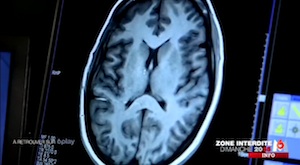
- 92'
- Author : Louis Lanher
- 27-09-2015
- Master : 2490
-
Share!
Super memory or amnesia: how do you live with an abnormal brain? | M6 | Zone Interdite
The brain is the most complex and the most essential area of our being. And yet experts consider that we know a mere 5% about the manner in which it works. Our memories are stored there; our emotions have their center there. However, this fragile area can falter and that is when are lives are turned upside down. Brain dysfunction now affects one person in three in Europe, at an annual cost of 800 billion Euros, vastly more than the costs resulting from cardiovascular disease and cancer. So, are we now able to repair a brain and even improve its performance? Over recent years research into this area has gone through a veritable revolution. With patients and doctors we set out to unravel its mysteries. Ingrid, at the age of 21, was about to become a flight attendant when she was hit by a car. The shock caused her to lose her memory. She no longer knows who she is or the purpose of a pen. This young woman must learn everything again: not only to recognize her family, but to rediscover the simple acts of daily life. Surrounded by her family and a team of experts, will she succeed in bringing her memories back to life? As for Paul, he has an extraordinary memory. The 12-year-old boy has Asperger’s syndrome. He can learn a poem or a sonata in the blink of an eye, but is unable to detect sadness or joy in a facial expression. So, is it possible to learn emotions? A medical team is helping Paul to develop his mirror neurons”, which help one understand others. Without that it will be difficult for him to have a social life or even to continue his studies. Losing all forms of emotion is what haunts Marjorie. At the age of 33, this mother of two will undergo an operation while awake. It’s a medical feat during which she will guide doctors during their procedure on her brain. She will be constantly responding to their questions in order to preserve the area that controls behavior and emotions. A procedure of the highest precision, right in the heart of the billions of neurons of the human brain.”
